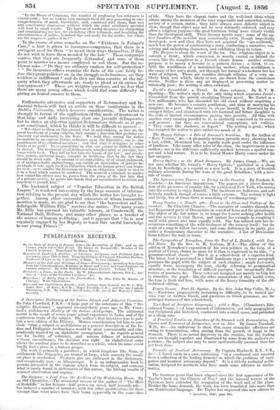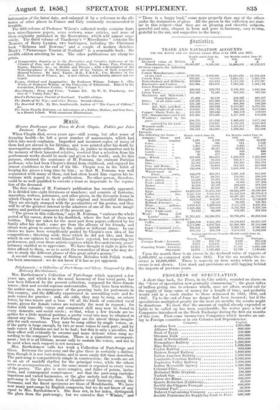PUBLICATIONS RECEIVED.
Boots.
On the State of Society in France before the Revolution of 1789; and on the causes which led to that Brent. By Alexis de Tocqueville, Member of the French Academy. Translated by Henry Reeve.
Memoirs of Frederick Perthes ; or Literary, Religious, and Political Life in Germany, from 1789 to 1843. From the German of Clement Theodore Perthes, Professor of Law in the University of Bonn. In two volumes.
Memoirs of the Life and Writings of James Montgomery; including Selections from his Correspondence, Remains in Prose and Verse, and Conversations on various subject*. By John Holland and James Everett. 'Volume VII.
Bothwell: a Poem, in Six Parts. By W. Edmondstoune Aytoun, D.C.L., Au- thor of " Lays of the Scottish Cavaliers," &c.
R'au-Run ; or Early Day in the North-West. By Mrs. John H. Kinzie, of Chicago. With Illustrations.
Ears and our Utptirity in Russia; with Letters from General Sir W. F. Wil- liams, Bart., of Kars, K.C.B.; Major Teesdale, C.B.; and the late Captain Thompson, C.B. By Colonel Atwell Lake, C.B., one of her Majesty's Aides- de-camp.
A Descriptive Dictionary of the Indian Islands and Adjacent Countries. By John Crawfurd, F.R.S.—A large part of the substance of this "De- scriptive Dictionary" appeared six-and-thirty years ago in Mr. Craw- furd's well-known History of the Indian Archipelago. The additional matter is the result of seven years' actual experience in India, and of the continuous study of the subject. The author's first intention was to pub- lish a new edition of his History. Mature consideration led him to con- clude "that a subject so multifarious as a general description of the In- dian and Philippine Archipelagos would be most conveniently and edm- pendioualy treated by an alphabetic arrangement." As regards general use for facility of reference, and minute fulness of information without encumbrance, the decision was right. An alphabetical order allows the smallest place to be described as a whole, when its name could hardly find a place in a history proper.
The work is primarily a gazetteer; in which kingdoms like Siam, or settlements like Singapore, are treated at large, while scarcely the small- est place is overlooked. Products also are embraced in the dictionary, and occasionally men—as Alboquerque. It is an indispensable book to persons interested in the regions which form its subject, and contains what is rarely found in dictionaries of this nature, the lifelong results of original observation and inquiry.
77w Enigma : a Leaf from the Archives of the Wolcherley House. By an Old Chronieler.—The occasional success of the author of "The Heir of Radcliffe" in her fictions—half grown-up novel, half juvenile tale— has induced a number of imitators, with few other qualifications for their attempt than what arises from their being apparently in the same class
of life. They have the elegant tastes and the well-bred ideas which obtain among the members of the very respectable and somewhat serious society of a certain status ; they have always some didactic object in view, though that object may not be very distinctly enforced, and very often a religious purpose—the good intention being more clearly visible than the theological skill. Their literary merits vary : some of the us- five faculties of the novelist may occasionally exist, though imperfectly developed; now and then they have not acquired the " ars scribendi, much less the power of constructing a story, conducting a narrative, con- ceiving and embodying characters, and exhibiting them in actien. The Enigma is about the worst of the lot. One religious object is to convert a Deist; which conversion is mostly carried on behind the scenes, like the slaughters in a French classic drama : another serious purpose is to marry a heroine to a pattern divine ; a third, to ex- hibit the worldliness of a matchmaking mother, whose worldliness is the cause of her son's death, not through her natural wickedness but her want of religion. There are troubles through villains, of a very un- likely kind, and which, likely or not, are drawn from the commonest stories. Neither is there any art displayed in presenting matter in- trinsically poor; the writing is often awkward.
Zurich Grandchild : a Novel. In three volumes. By R. V. M. Sparling.—The writer's style is the only thing which separates Zurier s Grandchild from the merest circulating library novel. Mr. Zuriel is a Jew millionaire, who has discarded his old creed without acquiring a new one. He becomes 'a country gentleman, and aims at marrying his daughter to a peer. She marries to please herself, is disowned by the enraged father, and abandoned with her husband and future daughter to the evils of limited circumstances passing into poverty. All this, with another story running parallel to it, is distinctly conceived in its scenes and persons ; but they are conventional conceptions, not realities. " They come like shadows, so depart." The writing is good ; which has tempted the writer to give rather too much of it.
The Happy Cottage : a Tale of Summer's Sunshine. By the Author of "Kate Vernon," &e.—A pleasantly-written juvenile story, showing how a bad, selfish, ill-trained boy, is rapidly made good under the influence of kindness. Like many other tales of the class, the improvement is too sudden ; nor is the difference sufficiently marked between a spoiled tem- per and a bad nature. It is to be feared Master Harry comes under the last category.
Harry Ogilvie; or the Black _Dragoons. By James Grant.—We are not sure whether Mr. Grant's "Harry Ogilvie," published in a cheap form by Routledge, is a reprint or a new book. It is a story of Scottish military adventure during the wars of the great Rebellion; with a love- tale of course.
The Sparrowgrass Papers; or Living in the Country. By Frederic S. Cozzens.—.An American importation. The papers are a jocose descrip- tion of the pleasures of country life, by a citizen of New York, who retires into the country to enjoy himself. The incidents are ludicrous, and suf- ficiently marked, though of course a little extreme. The writing is light and lively, but at times there is something of wordmongering.
Ferny Combes : a Ramble after Ferns in the Glens and Valleys of De- vonshire. By Charlotte Chanter.—The narrative of rambles through the less frequented parts of Devonshire in search of ferns and the picturesque. The object of the fair writer is to tempt the tourist seeking after health and fine scenery to visit Devon, and imitate her example in roughing it amid wild places and inns equally wild. She has infused into her de- scriptions something of the wild freshness of the scenery itself; but the want of a map to follow her route, and some deficiency in its unity, give rather a fragmentary character to the narrative. A list of Devonshire ferns follows the tour or tours.
The Cyropeedia ofXenophon, from the Text of L. Dindorf, with Eng- lish Notes. By the Rev. G. M. Gorham, M.A.—The editor of this edition of Xenophon's exposition of his own politics in the form of a portrait of Cyrus, claims no more for it than is expressed in its title "a grammar-school classic." But it is a school-book of a superior kind. The latest text is presented in a bold handsome type ; a terse paragraph possesses the pupil with the subject of each chapter ; ample foot-notes, equally terse, accompany the text, chiefly referring to grammatical structure, or the translation of difficult passages, but occasionally illus- trative of manners, •tc. These notes are designed not merely to help but to stimulate the pupil : like the other annotations of this useful series, the tone is fresh and free, with none of' the heavy formality of the old. fashioned editing.
Praxis Grim. Part II. Syntax. By the Rev. John Day Collis, M.A.. Am.—Exercises progressively increasing in difficulty, to be turned intr viva voce or written Greek, and questions on Greek grammar, are the principal features of this school-book.
Text-Book of Scripture Geography ; with a Map. [Chambers's Edu- cational Course.]—A large amount of information, not only geographical but Scriptural and historical, condensed into a small space, and published at a cheap rate.
A Practical Treatise on Disorders of the Stomach with Fermentation, the Causes and Treatment of Indigestion, and on Diet. By James Turnbull, M.D., &-e.—An endeavour to show that many stomachic affections are owing to fermentation, often arising from the growth of fungi in the stomach. There is no actual discovery in the treatise, but the leading cases are brought together and illustrated by some from the author's ex- perience; the subject also may be more systematically pursued than has yet been done.
Formula of :Nautical Astronomy. By Captain Shadwell, R.N., C.B., &c.—A dozen cards in a case containing "in a condensed and succinct form a collection of the leading formulm on which the problems of navi- gation and nautical astronomy depend." It is a strictly technical publi- cation, designed for mariners who have made some advance in math& matics.
The fourteen years that have elapsed since the first appearance of Dr. Taylor's book on the Climate of Pau* and the mineral waters of the Pyrenees have extended the reputation of the work and of the place. Besides the home demand, the work has been translated into more than one Continental language. Dr. Taylor has improved this new edition by
Spectator, 1842; page 784.
information of the latest date, and enlarged it by a reference to the cli- mates of other places in France and Italy commonly recommended to invalids.
The fifth volume of Professor Wilson's collected works contains four- teen miscellaneous papers, some reviews, some articles, and none of them originally published in the Recreations, which will appear sepa- rately. The third volume of Thackeny's " Miscellanies " contains the Memoirs of Barry Lyndon, two burlesques, including the Christmas book "Rebecca and Rowena," and a couple of modern sketches. Black's " Picturesque Tourist of Scotland" is a seasonable book ; the twelfth edition attesting its use. The other publications are cheap re- prints. A Comparative Inquiry as to the Prerentice and Curatire Influence of the Climate of Pau, and of Montpelier, Ilyeres, Nice, Rome, Pisa, Florence, Naples, Biarritz, &c., on Health and Disease ; with a Description of the Watering-places of the Pyrenees, and of the Virtues of their respective Mineral Sources. By Alex. Taylor, M.D., F.R.S.E., Cor. Member of the list. Institute of France, &c. A new edition, considerably altered and en- Essays, Critical and Imaginative. By Professor Wilson. Volume I. (The Works of Professor Wilson, of the University of Edinburgh. Edited by his Son-In-law, Professor Ferrier. Volume V.) Miscellanies: Prose and Verse. Volume III. By W. M. Thackeray, Au- thor of " Vanity Fair," Sc.
Black's Picturesque Tourist of Scotland. Twelfth edition.
The Banks of the Wye ; and other Poems. Second edition.
The Deserted Wife. By Mrs. Southworth, Author of "The Curse of Clifton," Sc.
The Siciss Family Robinson; or Adventures of a Father, Mother, and four Sons, in a Desert Island. With numerous Illustrations.



































 Previous page
Previous page